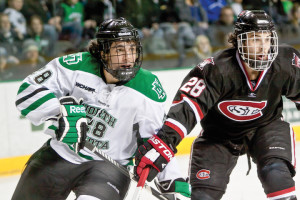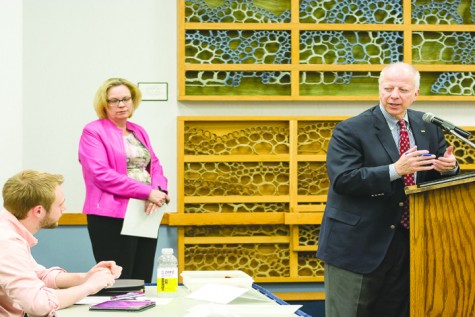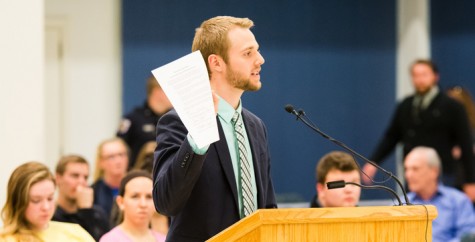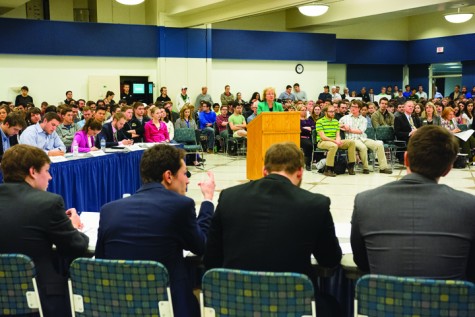Senate resolution raises tuition questions
Recent proposal by Student Government attempts to put temporary cap on tuition.
Student Body President Nick Creamer addresses Student Senate. Senate recently added a tuition cap for next year to its “One Stop Shop” bill. Photo by Keisuke Yoshimura/The Dakota Student.
Rising tuition cost is a much debated topic throughout the country. UND is not an exception as Student Senate recently passed a resolution tying tuition in with the “One-Stop Shop” proposal, to get the tuition increase at UND frozen for one year.
The Student Government executive team put the resolution together for the One-Stop Shop and decided to tie in tuition after spending a lot of time behind the scenes this past summer working to see what it could do to help students with the high price tag of college.
“We got input from the executive team, a legislator and someone on the State Board of Higher Education and received no negative feedback,” Student Body President Nick Creamer said. “We knew it would be a tough sell to the university, and we wanted to do it in the most appropriate way.
“We kept it a secret within the executive team so the administration didn’t hear it through the grapevine until all the members were on board with it.”
The original resolution asked for a five- year freeze of a 3.72 percent increase on tuition per year, something the administration said it would not even discuss. It was eventually dropped down to a one-year freeze on a 3.72 percent increase in tuition.
“They were open to a conversation about tuition,” Creamer said. “But they didn’t want it tied to an obligation.”
Tuition increases
Over the past 10 years, tuition at UND has increased at four times the rate of inflation, something that Creamer said really hit home to the administration.
Inflation has increased 25.6% in the past 10 years compared to 101% for tuition. For the 2002-03 school year, a North Dakota resident would have paid $2,954 for tuition. For the 2012-13 school year, that same resident would have paid $5,938.
“UND is absolutely conscious of student concern and share in student concern about affordability,” Vice President of Operations and Finance Alice Brekke said.
But Brekke made it clear that it is not in UND’s power to set the tuition rate increase each year, it is done by the State Board of Higher Education.
At the SBHE meeting in May, UND asked and was approved for a 4.9% increase on tuition for the 2014-15 school year.
But at the May 23 meeting, the board decided to reverse its decision and only allow for a 3.72% increase. Based on an estimated 3% inflation rate, this will leave the university approximately $3.3 million short in revenue.
“That is a high estimate for the rate of inflation, it is usually under half of that,” Creamer said.
A less than 3% rate of inflation coupled with a performance incentive fund from the Board of Higher Education could cover the estimated shortfall.
Next steps
Although senate passed the resolution, the final decision on whether it will go into effect lies with President Robert Kelley.
In a letter to Creamer, Vice President Lexi Hanson and the student senators, Kelley said, “the request for a tuition cap is something that neither Student Senate nor the University has the authority to enact on our own. The authority over tuition rates lies with the State Board of Higher Education (SBHE) … In the absence of all those considerations, we simply cannot support the Student Senate’s request.”
Kelley added, “… we are now exploring alternative ways to accomplish this goal without using the McCannel fees.”
Although the university won’t support the resolution, Creamer and Hanson submitted the request for the resolution to be put on the agenda for the next SBHE meeting on Nov. 21 and will be at the meeting to voice their thoughts on the resolution.
In the mean time, Brekke said the university will continue to work toward efficiency in operations and cost for students.
“In higher education, whether at the state of federal level, it is a very highly regulated environment,” Brekke said. “There are a lot of laws and regulations, more today than there ever have been previously. Compliance and how to meet the needs of our students is an on-going discussion.”
Megan Hoffman is a staff writer for The Dakota Student. She can be reached at megan.hoffman@my.und.edu.










